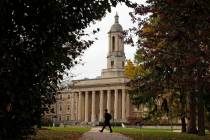Does higher education drive our economic growth?
Back in 2008, Nevada policymakers and higher-ed insiders warned that a $50 million cut to higher education would possibly send the Silver State back to the Dark Ages. Those predictions proved false and seem quite silly today.
Gov. Brian Sandoval's proposed budget cuts and the loss of the one-time federal stimulus means higher education will lose $258 million over the next biennium. While this is a large sum of money, it represents a manageable 7.4 percent cut from spending in the current biennium.
Since past hyperbole didn't stop budget cuts from happening, policymakers and educators are switching tactics and arguing that higher-education is the key to our economic salvation. Investing in higher education can attract high-tech jobs to help grow and diversify the economy, they argue.
The theory sounds very reasonable, even plausible. Unfortunately it is only supported by platitudes, anecdotes and cherry-picked reports.
These arguments point to Arizona, Colorado, Utah and North Carolina as places with growing high-tech industries and great universities. But they conveniently forget California -- a state that has bled residents and jobs for a decade despite having eight highly respected research universities and a little place called Silicon Valley.
Many states with top-notch research universities struggled to create jobs and retain residents. In fact, between 2000 and 2008, 2.5 million more people fled states with an Ivy League school than moved in.
States with a "Top 100" university, as ranked by U.S. News and World Report, also experience higher unemployment rates on average.
Defenders of the higher education status-quo also claim the reason Nevada struggles is because we don't have enough college graduates.
But an examination of data from the U.S. Census Bureau, Bureau of Labor Statistics and Bureau of Economic Analysis shows no relationship between college attainment rates and unemployment or even with the change in state GDP since the recession began. College attainment also has no correlation with state budget shortfalls as calculated by the left-leaning Center for Budget and Policy Priorities.
If higher education can't explain why some states struggle and others are recovering, we can't say with any certainty that higher education will be an engine of economic development -- especially if higher education doesn't evolve and innovate. At worst, spending more money to achieve the same results will retard our economic development.
In fact, that seems to be the case. According to Jay P. Greene, a professor at the University of Arkansas, colleges and universities across the nation are spending more money and employing more adults to do the same job.
According to data obtained from the Nevada System of Higher Education, UNR spent $35,000 per student in FY 2010 (excluding athletics and the medical school) while UNLV spent nearly $25,000 per student (excluding athletics, the dental school and the law school). Despite their expenses, neither UNR nor UNLV can graduate half their students after six years.
And it's not like UNR and UNLV are acting as the accessible institutions of social justice, as their apologists claim. According to the left-of-center Education Trust, our universities are white and elite. Just 11.8 percent of UNR students are low-income and 68 percent are white. UNLV is more diverse (48 percent white) but just 16 percent of its student population is considered low-income by Uncle Sam.
These are not results anyone should be defending. More importantly, no one should assume that spending more money and doing the same thing will produce different results. Unfortunately, policymakers and educators are doing just that. One school they would like to emulate is the University of Utah -- a school that is 79 percent white, 77 percent middle/upper-class, employs one adult for every three students and spends $50,000 per student, but only graduates 51 percent of its students after six years.
In other words, they're looking for ways to spend more money creating jobs for administrators and Ph.Ds than an actual education for Nevada's young or disadvantaged.
Yes, providing a good solid education can improve our economy, but you have to actually educate the students at a reasonable cost -- something that clearly isn't happening in America today.
Patrick R. Gibbons is an independent researcher and consultant in Las Vegas. He blogs from TheWesternWrangler.com.























